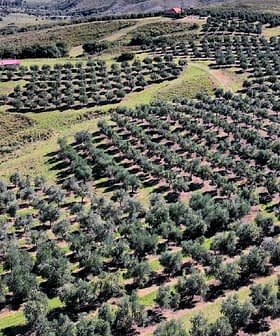Authorities Fear Europe’s Drought Will Stretch Through Winter
The president of an Italian irrigation association criticized the “silence” of the European Commisison on the matter and called for a continental plan.
 Molveno, Italy
Molveno, Italy Drought has crippled agricultural activities across Spain and Italy, traditionally the world’s two largest olive oil producers.
After a dry winter and an even drier spring and summer, the lack of significant rainfall has continued into the autumn.
The rain recently reported in a few regions did not ameliorate both countries’ severe water scarcity. The ongoing drought has dried up the soils and severely affected various cultivations.
See Also:How Intensive Agriculture and Olive Cultivation Impact Soil HealthFor example, rice production, a heavily water-dependent crop, is expected to decline between 70 and 80 percent in both countries.
Farmers in Italy and Spain usually count on rain in the autumn and winter fall to replenish aquifers, rivers and reservoirs after traditionally dry summers.
However, this did not happen last year, and officials are worried that it may not happen again. Rivers, reservoirs and lakes – all of which are crucial for irrigation – remain at very low levels.
According to the National Meteorologic Agency (Aemet), Spain has experienced a 63 percent drop in rainfall compared to the historical average.
Between October 1st and 11th, 9 millimeters of rain fell compared to the 24-millimeter average. The country is experiencing its third driest year since 1961.
Aemet scientists believe there is a 70 percent chance that there will be a lack of significant rainfall in the current crop year, especially in the center and west of the country, which are the areas most affected by the drought.
Italy is not faring any better. In its latest update, the National Research Council’s drought observatory warned that 30 percent of the country, mostly in the north, is experiencing a “severe to extreme” drought.
The observatory noted how sparse September rainfall did not reach the driest Italian regions.
“As it was easy to predict, while not being a solution to the harsh water deficit, such rainfall events have been in some cases very intense and damaging due to dry and compact soil and to more energy accumulated by the climate system in these hot months,” the report said.
See Also:Italy Announces €3.9B Investment in Water InfrastructureOther relevant European olive oil-producing countries, such as Portugal, have seen some improvement from the severity of the long drought.
According to the Portuguese Institute for Sea and Atmosphere, only 0.2 percent of the country was experiencing “extreme drought” at the end of September. However, more than 32 percent of the country is still affected by “severe drought.”
The European Drought Observatory’s latest data show that 27 percent of continental Europe is now considered an “alert zone,” meaning there is a precipitation deficit, increased soil moisture anomalies and vegetation growth anomalies.
The Italian consortia for water reclamation and irrigation (Anbi) warned that the continent’s drought now stretches from the Iberian peninsula to Moldova and from northwestern Italy to southern England.
Anbi criticized the “silence” of the European Commission regarding the ongoing drought.
“It is obvious that the climate crisis is fully involving Europe and that the problem must be addressed within a E.U- framework, for which we have been working for some time through [the association] Irrigants d’Europe,” said Francesco Vincenzi, the Anbi president.
“It is clear, however, Brussels’ resounding delay on these issues, which affects not only the environment and quality of life but also the shared goal of food self-sufficiency,” he concluded.








